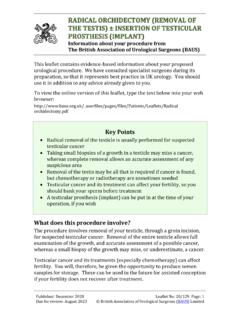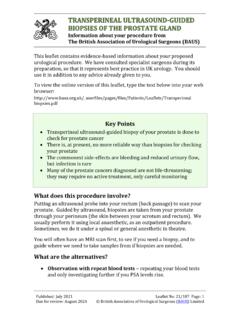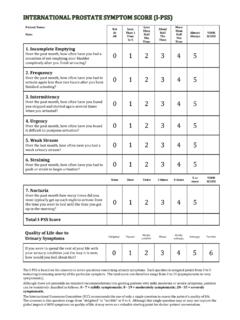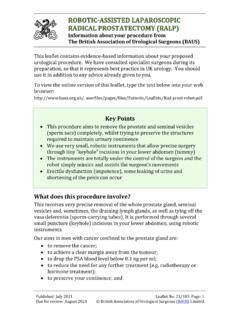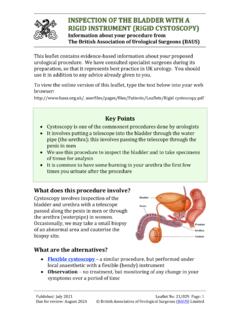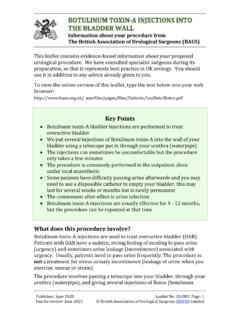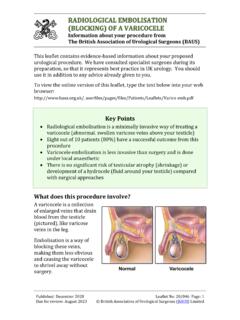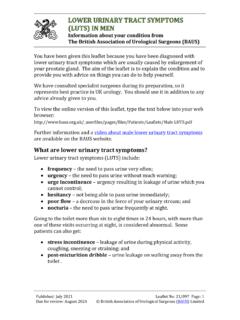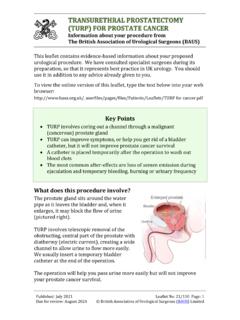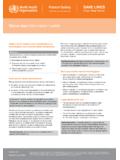Transcription of Information about your procedure from The British ...
1 Information about your procedure from The British Association of Urological Surgeons (BAUS) Published: January 2023 leaflet No: 21/013 Page: 1 Due for review: August 2024 British Association of Urological Surgeons (BAUS) Limited This leaflet contains evidence-based Information about your proposed urological procedure . We have consulted specialist surgeons during its preparation, so that it represents best practice in UK urology. You should use it in addition to any advice already given to you. To view the online version of this leaflet , type the text below into your web browser: What does this procedure involve? Telescopic inspection of your bladder and urethra (waterpipe) under local anaesthetic.
2 We can also take small bladder biopsies, remove a stent from your ureter (the tube between your kidney and bladder) and inject Botox into the wall of your bladder using this technique. Click here for a separate Information leaflet about Botox injections into the bladder wall. What are the alternatives? Rigid cystoscopy under general anaesthetic your urologist will advise you if this is necessary No treatment which may leave the cause of your symptoms unexplained Key Points Flexible cystoscopy is a diagnostic procedure to examine the inside of your bladder It can also be used to take biopsies from your bladder, remove ureteric stents or administer Botox injections into your bladder It is usually performed as an outpatient under local anaesthetic Mild burning on passing urine is common after the procedure but side-effects are rare Published: January 2023 leaflet No: 21/013 Page: 2 Due for review.
3 August 2024 British Association of Urological Surgeons (BAUS) Limited What happens on the day of the procedure ? Your urologist (or a member of their team) will briefly review your history and medications, and will discuss the surgery again with you to confirm your consent. If your flexible cystosc need to have an X-ray prior to the procedure . Details of the procedure we normally carry out the procedure under local anaesthetic we may give you some antibiotics before the procedure , after you have been checked for any allergies we instil a jelly containing local anaesthetic into your urethra (waterpipe) and leave it in place for a few minutes; this makes introduction of the telescope as comfortable as possible we put the cystoscope (flexible telescope) into your urethra (waterpipe) and pass it into your bladder men sometimes find that passing the telescope through the prostate is a little painful.
4 This only lasts a few seconds once the telescope is in place, we run sterile water slowly into your bladder so that we can inspect all the bladder lining if we find an abnormality inside your bladder, we may take a biopsy using a small pair of forceps passed through the telescope if you have had a ureteric stent placed previously, we can remove it using a pair of forceps passed through the cystoscope. a nurse will remain with you throughout the procedure we remove the telescope once we have completed the examination the procedure usually takes no more than a few minutes to complete you will be able to pass urine, wash and dress yourself after the procedure the doctor or nurse will explain the findings to you Published: January 2023 leaflet No: 21/013 Page: 3 Due for review: August 2024 British Association of Urological Surgeons (BAUS) Limited the procedure is normally performed on an outpatient basis, so you will be able to go home straight afterwards Are there any after-effects?
5 The possible after-effects and your risk of getting them are shown below. Some are self-limiting or reversible, but others are not. We have not listed very rare after-effects (occurring in less than 1 in 250 patients ) individually. The impact of these after-effects can vary a lot from patient to patient; you should ask your surgeon s advice about the risks and their impact on you as an individual: What is my risk of a hospital-acquired infection? Your risk of getting an infection in hospital is between 4 this includes getting MRSA or a Clostridium difficile bowel infection. The risk is lower for outpatient procedures but higher if you are in a high-risk group of patients such as patients who have had: long-term drainage tubes ( catheters); long hospital stays; or multiple hospital admissions.
6 What can I expect when I get home? you will get some burning and bleeding over the first few days when you pass urine you should drink twice as much fluid as you would normally for the first 24 to 48 hours to flush your system through if you develop a fever, severe pain on passing urine, inability to pass urine or worsening bleeding, you should contact your GP immediately any antibiotics or other tablets you may need will be arranged & dispensed from the hospital pharmacy a follow-up appointment may be made for you to discuss any further treatment After-effect Risk Mild burning or bleeding on passing urine for a short period after the procedure Almost all patients Infection in your urine requiring antibiotics Between 1 in 50 & 1 in 100 patients Published: January 2023 leaflet No: 21/013 Page: 4 Due for review.
7 August 2024 British Association of Urological Surgeons (BAUS) Limited General Information about surgical procedures Before your procedure Please tell a member of the medical team if you have: an implanted foreign body (stent, joint replacement, pacemaker, heart valve, blood vessel graft); a regular prescription for a blood thinning agent ( warfarin, aspirin, clopidogrel, rivaroxaban, dabigatran); a present or previous MRSA infection; or a high risk of variant-CJD ( if you have had a corneal transplant, a neurosurgical dural transplant or human growth hormone treatment). Questions you may wish to ask If you wish to learn more about what will happen, you can find a list of suggested questions called "Having An Operation" on the website of the Royal College of Surgeons of England.
8 You may also wish to ask your surgeon for his/her personal results and experience with this procedure . Before you go home We will tell you how the procedure went and you should: make sure you understand what has been done; ask the surgeon if everything went as planned; let the staff know if you have any discomfort; ask what you can (and cannot) do at home; make sure you know what happens next; and ask when you can return to normal activities. We will give you advice about what to look out for when you get home. Your surgeon or nurse will also give you details of who to contact, and how to contact them, in the event of problems. Smoking and surgery Since you are only having a local anaesthetic, stopping smoking will have no effect on this procedure .
9 Smoking can, however, cause cancers of the urinary tract so we strongly advise you to stop smoking. For advice on stopping, you can: contact your GP; access your local NHS Smoking Help Online; or ring the free NHS Smoking Helpline on 0300 123 1044. Driving after surgery Published: January 2023 leaflet No: 21/013 Page: 5 Due for review: August 2024 British Association of Urological Surgeons (BAUS) Limited It is your responsibility to make sure you are fit to drive after any surgical procedure . You only need to contact the DVLA if your ability to drive is likely to be affected for more than three months. If it is, you should check with your insurance company before driving again.
10 What should I do with this Information ? Thank you for taking the trouble to read this Information . Please let your urologist (or specialist nurse) know if you would like to have a copy for your own records. If you wish, the medical or nursing staff can also arrange to file a copy in your hospital notes. What sources have we used to prepare this leaflet ? This leaflet uses Information from consensus panels and other evidence-based sources including: the Department of Health (England); the Cochrane Collaboration; and the National Institute for Health and Care Excellence (NICE). It also follows style guidelines from: the Royal National Institute for Blind People (RNIB); the Information Standard; the Patient Information Forum; and the Plain English Campaign.
